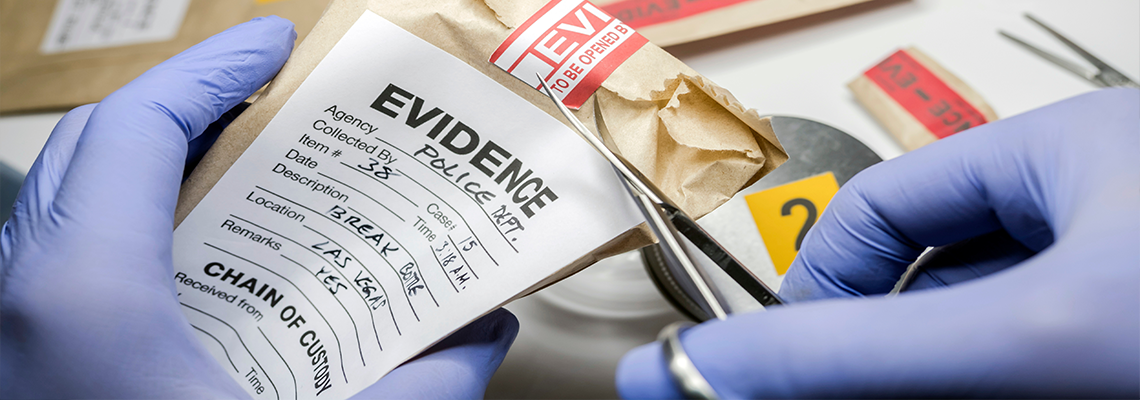
UNDERSTANDING EVIDENCE IN A CRIMINAL TRIAL
Very few people who are facing criminal charges will actually see the inside of a courtroom since most cases are settled outside the courtroom. However, if you are heading into a criminal trial, you need to be educated about the proceedings and specifically how evidence can and can’t be used against you.
In 2020, of the nearly 170,000 criminal cases that were heard in the district courts of Texas, 45% resulted in a conviction. The role of evidence is crucial to avoiding a conviction or minimizing your penalties. Your case hinges on how well your defense attorney presents evidence on your behalf and challenges or discredits the prosecution’s evidence.
If you’re concerned about a criminal charge, call us at MC Criminal Law today. We represent clients in the Dallas, Texas, area or anywhere throughout North Texas including Fort Worth, Denton, McKinney, and other surrounding cities. We provide our clients with highly personalized legal representation, not only to achieve the best outcome for your current case but also to support your future success.
What is Evidence?
Evidence is any information that’s used in a criminal trial with the intention of proving or disproving a disputed fact. Both the prosecution and the defense use evidence to convince a judge or jury of their side of the case. Criminal evidence can range from a weapon, item of clothing, or vehicle to a photograph, video/audio recording, or witness testimony. Lastly, many trials (especially in the past few decades) are making use of scientific evidence such as fingerprints, DNA findings, voice recognition and analysis, autopsy reports, and hair and skin evidence.
Direct vs. Circumstantial Evidence
In general, evidence falls into two categories—direct and circumstantial. Examples of direct evidence would be an eyewitness who saw the suspect commit the crime in question, the actual weapon that was used to commit the crime, or a confession from the defendant.
Circumstantial evidence does not have to show a direct link but must relate to the crime through a logical connection. For example, if an eyewitness testified to seeing the suspect flee from the scene while holding the murder weapon but did not see the actual crime committed, that testimony would be admitted as circumstantial evidence. Or, perhaps the defendant’s DNA was found at the scene of the crime along with other people’s DNA. This alone wouldn't be enough to directly link to the crime, but there’s a clear and logical connection. Both direct and circumstantial evidence are used regularly in a criminal defense case.
Relevance of the Evidence
Another important aspect of how evidence is used in a criminal trial is the concept of relevance. A piece of evidence will not be admissible unless relevance is shown. In general, this means that your evidence must relate to the case, to the character of the defendant, or to a witness, or the evidence must specifically support a disputed fact. For example, if you were charged with shooting someone, and the prosecution shows evidence that you purchased a gun a week prior to the incident, this would be admissible evidence since your previous actions show relevance to the crime in question.
What Evidence May Be Not Admissible?
The relevance of evidence may be called into question by either the judge or the opposing side’s attorney. If it’s determined to be irrelevant, then it becomes inadmissible, and jurors will not be allowed to consider it in their deliberations. One common example of inadmissible evidence is called hearsay, which refers to any statement that’s made outside of the courtroom (excluding written statements or audio recordings presenting as admissible evidence.) For example, if you were on trial for murder, a witness cannot testify that a friend of yours told her that you committed the crime.
The exclusionary rule also can cause evidence to become inadmissible. This refers to any evidence that is obtained illegally and in violation of your constitutional rights, such as physical evidence found in an illegal search or statements you made after an illegal arrest.
Legal Guidance You Can Trust
If you’re concerned about a criminal charge, contact an experienced criminal defense lawyer as soon as possible and refrain from speaking with law enforcement until you speak with an attorney. At MC Criminal Law in Dallas, Texas, Messina Madson and Kendall Castello have more than 30 years of combined experience in criminal law. We have tried more than 300 cases to a jury, from drug and domestic violence cases to capital murder and sex crimes. You need a competent attorney who has built long-term relationships with local law enforcement and knows how to examine every angle of your case. Call us today to discuss your options.